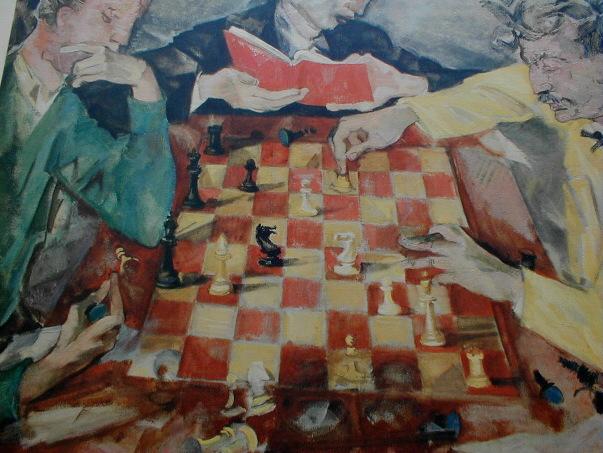Like a rabbit hypnotized by a python

This is what David Bronstein wrote before the Sacrifice in this game in his Zurich International 1953 book.
"The creative element of chess is generally thought to consist of three things: logic, accurate calculation, and technuique (this last includes a knowledge of theory). There is a fourth ingredient also, however, perhaps the most intriguing of all, although it is often overlooked. I refer to intuition - chess fantasy, if you prefer.
Occasionally a position arises in the course of a game which cannot be evaluated on general principles, such as pawn weaknesses, open lines, better development, etc., since the state of equilibrium has been upset on several counts, rendering an exact weighing of the elements impossible. Attempting to calculate the variations doesn't always work, either. Imagine that White has six or seven different continuations, and Black five or six replies to each move; it's easy to see that no genius on earth could reach even the fourth move in his calculations. It is then that intuition or fantasy comes to the rescue: that's what has given the art of ches its most beautiful combinations, and allowed chessplayers the chance to experience the joy of creating.
It is not true to say that intuitive games were only played in the days of Morphy, Anderssen and Chigorin (as if now, in our era, everything were to be based totally on positional principles and rigorous calculation!): I remain convinced that, even in the games which received the brilliancy prizes at this tournament, not all of the variations were calculated to the end. Intuition has been and remains one of the cornerstones of chess creativity - of which we shall now see proof positive." David Bronstein,
Cut and Pasted from this site and this site
Occasionally a position arises in the course of a game which cannot be evaluated on general principles, such as pawn weaknesses, open lines, better development, etc., since the state of equilibrium has been upset on several counts, rendering an exact weighing of the elements impossible. Attempting to calculate the variations doesn't always work, either. Imagine that White has six or seven different continuations, and Black five or six replies to each move; it's easy to see that no genius on earth could reach even the fourth move in his calculations. It is then that intuition or fantasy comes to the rescue: that's what has given the art of ches its most beautiful combinations, and allowed chessplayers the chance to experience the joy of creating.
It is not true to say that intuitive games were only played in the days of Morphy, Anderssen and Chigorin (as if now, in our era, everything were to be based totally on positional principles and rigorous calculation!): I remain convinced that, even in the games which received the brilliancy prizes at this tournament, not all of the variations were calculated to the end. Intuition has been and remains one of the cornerstones of chess creativity - of which we shall now see proof positive." David Bronstein,
Cut and Pasted from this site and this site
30...Qxh3+ Now the weakness of the pawn at h3 tells. The point of Kotov`s remarkable combination, which all his previous play went to prepare, is to drag the white king out to f5, where it will be defenseless against Black`s two rooks, knight and bishop; while White`s five pieces, deep in his rear echelon, can only look on from afar. 31.Kxh3 Rh6+ 32.Kg4 Nf6+ 33.Kf5 Like a rabbit hypnotised by a python, the king advances unwillingly to the place of its doom.
They just don't annotate like this anymore . 8)


3 Comments:
At 9:01 AM, Sir Nemo said…
Sir Nemo said…
I too wish that games were analyzed in a similar fashion today. Modern masters rely too much on theory and it kind of makes the game boring. If everybody played like Tal(or Shirov today), the game would be much more fun and 'brilliant'.
I agree with the intuition factor. No matter how far I calculate a combination, if I see a move that i just KNOW is the right move, I will make that move. Even if it means loss of heavy material. I tend to take my games more and more into unfamiliar territory and I have to rely on my intuition much more than my actual evaluation and calculation skills.
There's nothing like originality and creativity over the chessboard. Very nice post.
At 12:41 PM, drunknknite said…
drunknknite said…
Bronstein is the shit.
At 7:49 AM, takchess said…
takchess said…
Nemo,
I guess it is best to know what to play but not always possible. Playing Sharp doubleedged positions which is unclear what is going to happen exactly is my kind of chess.
DK,
The King Shite! I felt his death was a greater loss to the chess community. Far more than Fischers.
Post a Comment
<< Home